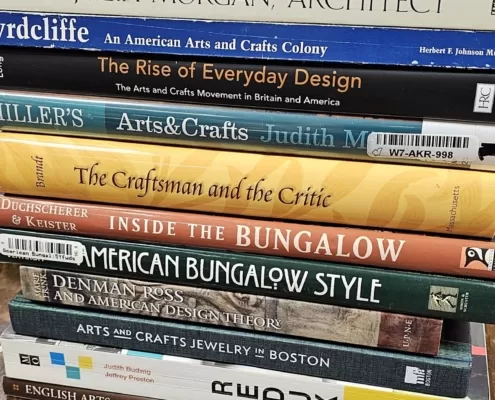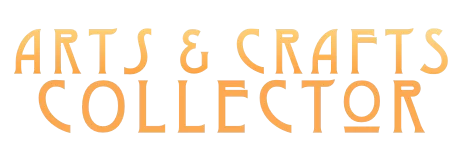In Defense of Books and the Bookstore: Have We Leaned In Too Far Into Digital Assets?
by Kate Nixon

Just a small selection of books that I have purchased in the past few months. But how many of us purchase the ebook version as an alternative to waiting for the hard bound version? Is it truly worth it to purchase books anymore? Spoiler alert: I say absolutely YES.
Is it just me or has the threat towards hard bound publications reached an all-time high lately?
Never mind the number of magazines dedicated to the Arts and Crafts movement dwindling down to just a small handful. Never mind the fact that librarians across the country are making headlines fighting to save banned books. Never mind that brick and mortar bookstores have closed as they are unable to compete with the ease and convenience of online book providers.
Of course I say the latter having just received a large order of books: one on the Byrdcliffe Art Colonies, two on the life of architect Julia Morgan and two books on Bungalow Design – all ordered online. It’s just so easy. Just writing about it makes me feel guilty, especially remembering bookstores as being a cool and calming respite from life in general. It’s almost like I need to retrain my brain to schedule a visit to my local bookstore every so often. Having said that, most bookstores these days have recognized the need to list their inventory online to retain the needs of their busy customers who want to support them but don’t have the time to spend meandering through the bookstore. A number of them have built in coffee shops, a schedule of author and book signing events, and expanded their inventory into holiday gifts and media in order to encourage their supporters to enter their stores. They live in between two eras in order to accommodate readers of all generations.
But aside from the plight of the bookstore and their efforts to keep surviving, I pose another question: are we losing our connection to the bound publication, all in the name of having a downloadable backup in case of a natural disaster? Maybe as a Xennial or older member of the Millennial generation, I still retain an affinity for the hard bound book with younger memories of enjoying books, making scrapbooks with pictures, and writing in journals. A significant number of the younger generations are a different story. Increasingly raised among the digital environments, the younger generations are more at risk for losing a connection to books that aren’t easily downloadable through their phones. While there is a growing surge of makers in the younger generations (a quick YouTube search on Bookbinding brings up a few accounts dedicated to the art of bookbindery from young enthusiasts), it is clear that the hard-bound publication has had an unclear future. Will they continue to have not just an unclear future — or not be considered at all by younger readers and scholars?
All of this chat comes down to a recent interaction my mother and I had with the online marketplace juggernaut known as Amazon. We lost an entire Kindle ebook collection because of a mixup and they couldn’t fix the problem because of one simple phrase. “Digital Assets.” Weeks later, that phrase triggers waves of instant irritation for us both. Here’s what happened:
What was supposed to be a simple transfer turned into a lesson in Digital Assets management. We were attempting to migrate an old library of Kindle ebooks to my mother’s new account. The large library of ebooks was under my father’s account. As many of you readers know, he passed away this past December and in picking up the pieces, we just wanted to migrate the library over to the new account. Due to a misunderstanding, the rep walked my mom through getting the new account connected to the Kindle – but in the process deleted the old account and the Kindle library of more than 100 titles. Amazon did get us a partial refund, however, it was the paperwork afterward we had to submit that introduced us to the phrase “Digital Assets.” In the aftermath, not only did we have to submit a death certificate and a marriage certificate, but a document from my father’s will declaring the Digital Assets through Amazon listed as an asset transferable to a listed surviving member of the family. We had the first two, but not the latter.
Right. Because in thinking about priority assets when developing my father’s will, we were really thinking about a Kindle library. What a mess.
Annoyances aside, here’s the fact when it comes to the younger generations: digital assets are very real. Some are very valuable and very likely to be included in wills of their own. While I’m not sure that Kindle libraries would be that common to consider in making a will, rest assured digital assets will become increasingly relevant to future wills to be written.
Now, as Arts and Crafts collectors, digital assets hasn’t fully entered our world, especially since we deal and collect in the antique or contemporary handcrafted. The larger art world is certainly dealing with digital assets (see NFTs as an example), but my argument here deals in the shift to ebooks and digital content over the hardbound. A simple search of Amazon titles does reveal a few titles on Gustav Stickley to have a Kindle version and would-be younger collectors and decorative arts scholars may choose a Kindle book to read for their research rather than ordering the hardbound form. If younger generations cling to the online environment, it is indeed beneficial for information to be accessible about the Arts and Crafts movement. But as we all know: not all online content should be considered equal in the eyes of dedicated scholars. It could be argued that some online information doesn’t fully represent the Arts & Crafts movement. It can put all the emphasis on the designs of William Morris rather than considering American contributions. It could make the jump too quickly to the Maker movement or the DIY movement. An online interview with Rudy Ciccarello, founder of The Museum of the American Arts & Crafts Movement and the Two Red Roses Foundation, showed the proper understanding and appreciation of the movement as a concern of his.
If the digital revolution brings information and research to everyone rather than a few, that is not necessarily evil. But at the cost of losing the importance of the hard bound book altogether? Not on my watch. So do me a favor. If you have a favorite bookstore (whether it’s a mom and pop store or a chain), consider looking up to see if there’s an author signing that would interest you. If you can’t make any of their events, consider ordering a book either with shipping or consider visiting one to pick it up. Bookstores need support, online booksellers need support, and of course, authors of books about the Arts and Crafts movement need support. If you need a recommendation, see our reference library here.
The medium has always been the message. Just remember that the next time you literally pick up a book.
“This will never be a civilized country until we spend more money for books than we do for chewing gum.” – Elbert Hubbard

